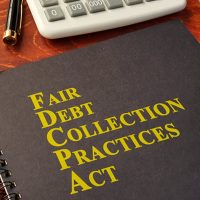CFPB Files Amicus Brief In FDCPA Case

The Consumer Financial Protection Bureau (CFPB) recently filed two amicus briefs. The first amicus brief was filed in a First Circuit case involving the Fair Debt Collection Practices Act (FDCPA). The second brief was filed jointly with the Federal Trade Commission (FTC) in a Fourth Circuit case involving the Fair Credit Reporting Act (FCRA).
The FDCPA case
In Carrasquillo v. CICA Collection Agency, the plaintiff, after having filed for bankruptcy, received a collection letter from the defendant (CICA Collection Agency) regarding a debt he owed for telephone and communication services. In the letter, the defendant stated that the debt was “due and payable” and that the creditor was “fully entitled to initiate legal action” against the plaintiff. In the lawsuit, the plaintiff alleged that the letter violated numerous FDCPA provisions. In particular, the letter violated the FDCPA provision that prohibits a debt collector from using false, deceptive, or misleading representation in connection with the collection of any debt. The plaintiff claimed that the representations made in the collection letter were false because he was protected at the time by bankruptcy’s automatic stay. Thus, the plaintiff contended that the debt was not due and the defendant could not begin a debt collection lawsuit against him.
The defendant moved to dismiss the lawsuit on the basis that the FDCPA only prohibits knowing or intentional violations of the rule and that the defendant was unaware of the plaintiff’s pending bankruptcy. The district court granted the motion to dismiss the lawsuit. The plaintiff appealed the dismissal to the U.S. Court of Appeals for the First Circuit.
The CFPB filed an amicus brief in support of the plaintiff. The CFPB argued that the FDCPA does not implicitly make misrepresentations unlawful only when the debt collector makes them knowingly or intentionally. Thus, the district court erred in reading such a requirement into the case. According to the CFPB, the plain language of the FDCPA and other FDCPA provisions show that Congress could have added a scienter (knowledge) requirement if it intended such a requirement to apply. The CFPB also argued that the bona fide error provision in the FDCPA’s civil liability section establishes that a debt collector will be liable for unintentional violations if it cannot show that the violations resulted from a bona fide error and it maintained procedures reasonably adapted to avoid such errors. The CFPB thus argued that there would be no reason to include such a provision if showing that the violation was unintentional was enough to avoid liability.
Talk to a Columbus, OH FDCPA Violations Attorney Today
The Columbus consumer lawyers at Kohl & Cook Law Firm, LLC represent the interests of those who have had their rights violated by debt collectors. Call our office today to schedule a consultation, and we can discuss the details of your interactions with debt collectors to determine if they’ve violated federal law. If so, we can help you file a FDCPA lawsuit against them and recover damages related to the violation of your rights.
Source:
consumerfinancemonitor.com/2024/01/04/cfpb-files-amicus-briefs-in-fdcpa-case-and-also-files-amicus-brief-in-fcra-case-jointly-with-ftc/
